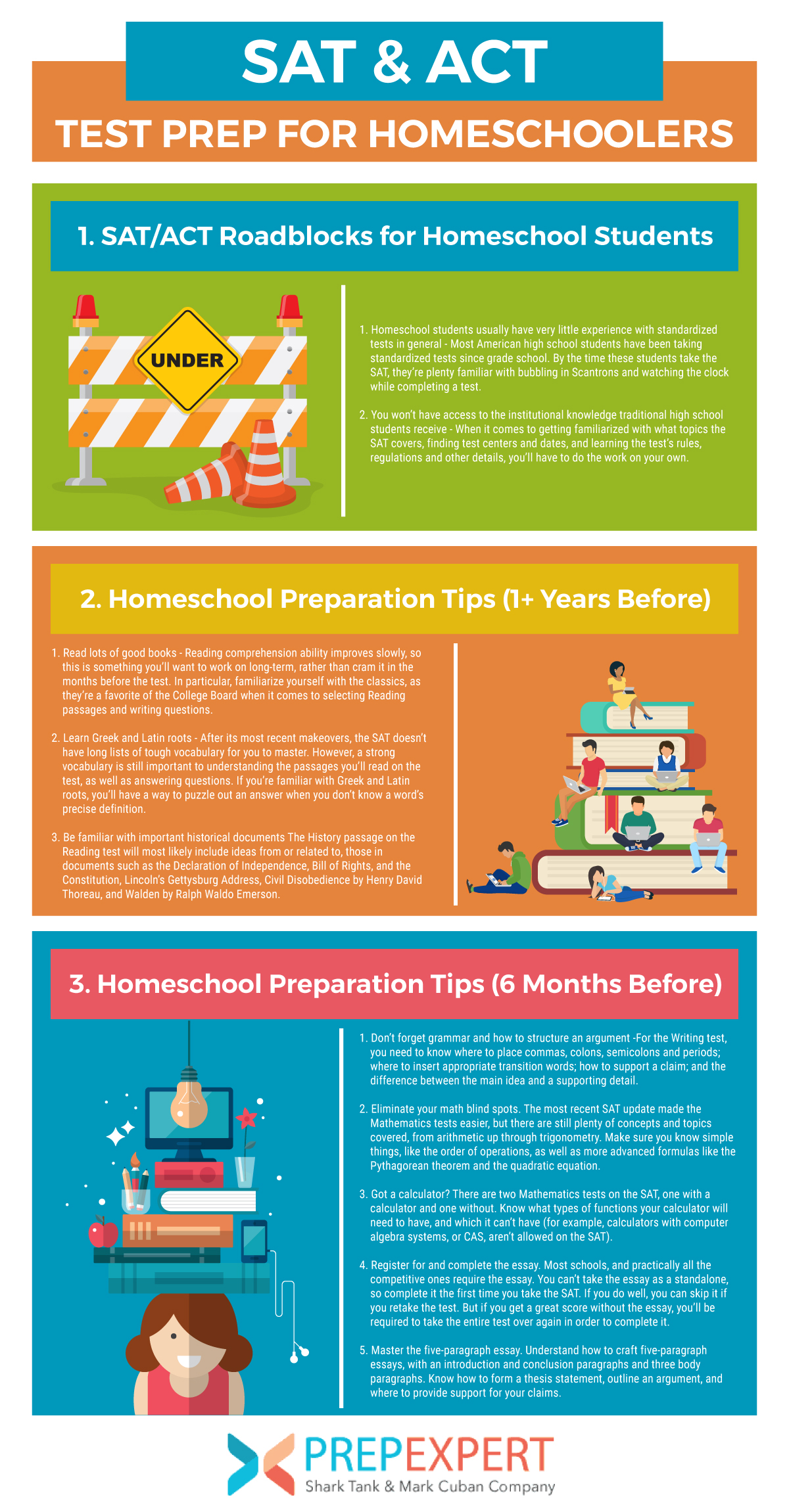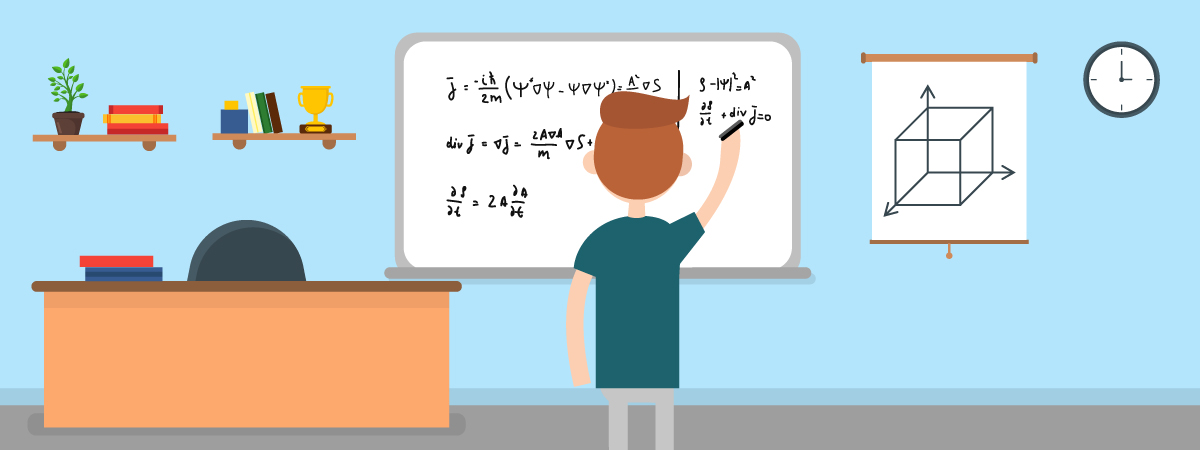SAT & ACT Test Prep For Homeschoolers
There are plenty of elements of the typical high school experience — homeroom, Friday night football games, homecoming, prom, even putting your books in a locker every day — that as a homeschool student, you probably haven’t been a part of.
However, there is one high school rite of passage that you certainly won’t be missing out on if you’re planning on attending college: the SAT.
If you’re a homeschool student or the parent of a homeschool student gearing up for the SAT and/or ACT, here’s a few important things to keep in mind along the way.
[sat_one]
And remember: if you need any help along the way, give us a call and we’d be happy to help! Not only do we offer free, 20-minute phone consultations, but also the best SAT prep in the nation.

The SAT/ACT Is Critical For Homeschool Students
Although some colleges and universities are beginning to do away with the standardized testing requirement, the vast majority of schools still require one of either the SAT or the ACT for admissions purposes.
And arguably, performing well on one of these tests is even more important for a homeschooled student: without grades or a GPA to indicate your academic prowess, your standardized test score is the only objective marker of your ability college and university admissions officials will have.
Sure you’ll have SAT Subject test and AP scores as well, but none of these exams are as comprehensive or indicative of your overall academic ability as the SAT.
[leadmagnet_five]
Furthermore, admissions officers won’t have the benefit of experience with alumni from your high school who have matriculated at their schools to determine if the rigor of the work you’ve done in the last four years has prepared you for the demands of a college curriculum.
When it comes time to submit applications, your SAT score will be your most important credential. So it’s essential that you do well.

The SAT/ACT Is Tougher For Homeschool Students
There are plenty of reasons why the SAT might be more difficult for homeschool students — even exceptionally well-prepared and intelligent ones — as compared to traditional high school students.
For starters, homeschool students have very little experience with standardized tests in general. Most American high school students have been taking standardized tests (such as STAR in California, NYSTP in New York and TAKS in Texas) since grade school. By the time these students take the SAT, they’re plenty familiar with bubbling in Scantrons and watching the clock while completing a test. As a homeschool student, you may have never done these things before.
Another disadvantage is that you won’t have access to the institutional knowledge of traditional high schools that students receive. When it comes to getting familiarized with what topics the SAT covers, finding test centers and dates, and learning the test’s rules, regulations and other details (like which high school registration code to use on the test), you’ll have to do the work on your own.
Of course, just because there’s more work for homeschool students doesn’t mean that you can’t be just as well-prepared as — or even more well-prepared than — traditional high school students. There are lots of things you can do to get yourself up-to-speed and knock admissions counselors’ socks off with a stellar SAT score.
[sat_two]

A Year Or More Before The Test: Prepare Yourself Academically
The most important thing you can do is prepare yourself academically. In the years before you take the SAT, you’ll want to:
Read lots of good books. Reading comprehension ability improves slowly, so this is something you’ll want to work on over the long term, rather than try to cram it in the months before the test. In particular, familiarize yourself with the classics, as they’re a favorite of the College Board when it comes to selecting Reading passages and writing questions.
Reading authors like Jane Austen (Emma, Pride and Prejudice), Charlotte Brontë (Jane Eyre), Emily Brontë (Wuthering Heights) will prepare you for the most difficult passages on the SAT.
Learn Greek and Latin roots. After its most recent makeovers, the SAT doesn’t have long lists of tough vocabulary for you to master. However, a strong vocabulary is still important to understand the passages you’ll read on the test, as well as answering questions.
One type of question where a strong vocabulary will come in handy is the vocabulary-in-context question, where you have to identify the meaning of a word based on its use in the passage. If you’re familiar with Greek and Latin roots, you’ll have a way to puzzle out an answer when you don’t know the precise definition of a word.
Be familiar with important historical documents. The History passage on the Reading test will most likely include ideas from or related to, those in documents such as the Declaration of Independence, Bill of Rights, and the Constitution, Lincoln’s Gettysburg Address, Civil Disobedience by Henry David Thoreau, and Walden by Ralph Waldo Emerson.
Other examples include speeches from the women’s suffrage movement (Susan B. Anthony, Elizabeth Cady Stanton, and others), and Martin Luther King, Jr.’s “I Have a Dream” speech and Letter from Birmingham Jail. You can be sure that the rhetorical strategies employed in these and other similar works of great profoundness will make their way into your big exam.

Six Months Before The Test: Go After The SAT/ACT Itself
In the six months before you are looking to take either the SAT or ACT, make sure to do these tips as the test day comes up:
Don’t forget grammar and how to structure an argument. For the Writing test, you need to know where to place commas, colons, semicolons and periods; where to insert appropriate transition words; how to support a claim; and the difference between the main idea and supporting detail. Even many traditional high school students have forgotten some of these rules by the time they take the SAT. But that doesn’t make knowing them any less important to achieving a top score.
Eliminate your math blind spots. The most recent update to the SAT made the Mathematics tests slightly easier, but there are still plenty of concepts and topics covered, from arithmetic up through trigonometry. Make sure you know simple things, like the order of operations, as well as more advanced formulas like the Pythagorean theorem and the quadratic equation.
The SAT does provide some formulas and equations at the start of each test, but knowing them by heart will save you time flipping pages back and forth, and improve your overall confidence.
Got a calculator? There are two Mathematics tests on the SAT, one with a calculator and one without. Know what types of functions your calculator will need to have, and which it can’t have (for example, calculators with computer algebra systems, or CAS, aren’t allowed on the SAT). Be sure you know how to use the calculator, too! Although they’re tremendously useful on section 4 of the exam, they’re not intuitive.
Register for and complete the essay. Yes, of course, the essay is optional. Except, it isn’t. Not if you’re applying to college, that is. While there are a small number of schools that don’t require the essay as a part of your SAT score, most schools, and practically all the competitive ones, do.
You can’t take the essay as a standalone, so complete it the first time you take the SAT. If you do well, you can skip it if you retake the test. But if you get a great score without the essay, you’ll be required to take the entire test over again in order to complete it.
Master the five-paragraph essay. By the time high school students take the SAT, they’ve completed dozens of five-paragraph essays, with an introduction and conclusion paragraphs and three body paragraphs. These students know how to form a thesis statement, outline an argument, and where to provide support for their claims. As a homeschool student, you’ll need to know this, too, for both the Writing test (section 2) and the essay.

How Prep Expert Offers Test Prep For Homeschoolers
As mentioned earlier, you probably don’t have much experience with standardized tests, so practice filling in Scantrons and completing timed practice sections. When it comes to doing this, there’s no greater resource than a prep course, such as those offered by Prep Expert.
In addition to learning test-taking strategies and getting a heads up on things like trap answers and the different SAT question types, Prep Expert classes will provide you with regular practice tests, which you’ll complete under simulated testing conditions. After completing a bunch of these, you’ll be well-prepared for the rigors and pressure of test day.
And remember those small details we mentioned? Find out early on where and when tests are administered, because registration deadlines come weeks before actual test dates. The high school registration code for homeschool students is 970000. The College Board website, as well as the Prep Expert blog, are excellent resources for finding this sort of information.
[sat_three]
For more test strategy, college admissions, and scholarship application tips sign up for our FREE class happening right now!
Test Prep For Homeschoolers FAQ
Why is it important for homeschoolers to take the SAT or ACT?
Without grades or a GPA to indicate your academic prowess, your standardized test score is the only objective marker of your ability college and university admissions officials will have.
Why are the SAT and ACT difficult for homeschoolers to prepare for normally?
For starters, homeschool students have very little experience with standardized tests in general. Another disadvantage is that you won’t have access to the institutional knowledge of traditional high schools that students receive.
How can homeschoolers start preparing a year in advance?
Read lots of good books. Learn Greek and Latin roots. Be familiar with important historical documents.
How can homeschoolers start preparing 6 months in advance?
Don’t forget grammar and how to structure an argument. Eliminate your math blind spots. Register for and complete the essay. Master the five-paragraph essay. Make sure to find and practice with an authorized calculator.
Written by Dr. Shaan Patel MD MBA
Prep Expert Founder & CEO
Shark Tank Winner, Perfect SAT Scorer, Dermatologist, & #1 Bestselling AuthorMore from Dr. Shaan Patel MD MBA

How to Get Into Stanford: Breaking Down Stanford Admission Requirements in 2024
Applying to college is overwhelming no matter what schools are on your list, but you might find yourself sweating a…

Why DEI is Destroying Meritocracy and How MEI Can Save Us
In recent years, Diversity, Equity, and Inclusion (DEI) initiatives have become a cornerstone of many corporate and educational policies. While…

Should I Take an SAT Prep Course?
If you’re getting ready to take the SAT soon, you might be wondering whether or not you should enroll in…